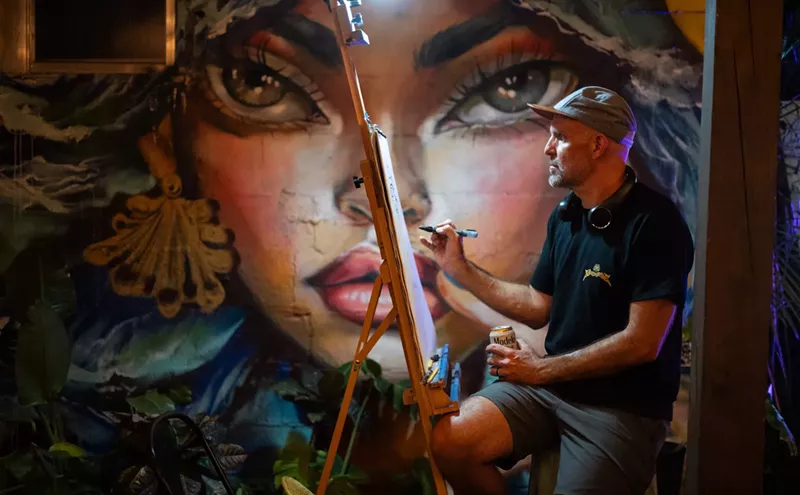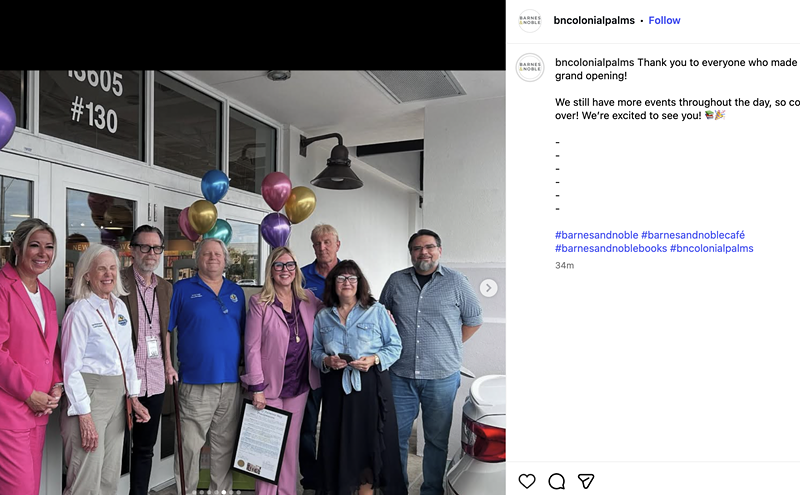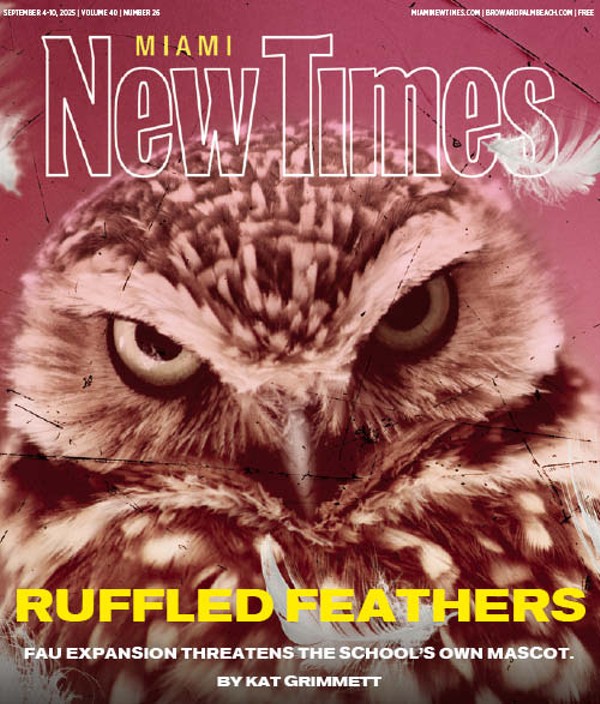Inside Wynwood's Mitrani Warehouse, a mound of stones lies on the floor. Suspended above it is an identical mass of rocks. They reference the cairns typically used to mark paths.
Projected onto the pile plays a video filmed in Florida, Virginia, Wyoming, Nevada, Utah, and Canada depicting soaring gulls and flowing rivers. The hypnotic soundtrack features snippets of poems by William Blake, T.S. Eliot, Pablo Neruda, Sylvia Plath, Walt Whitman, and others.
Wendy Wischer's multisensory reminder of the environmental changes confronting our planet — "Escaping Gravity" — is an apt metaphor for Wynwood's dramatic transformation from blighted neighborhood to arts mecca, which two local sisters are marking during this weekend's Second Saturday Art Walk.
"It was the first studio I had outside of my house, and I loved it. It was a pivotal moment."
tweet this
"Inescapable change is taking place here," observes Rhonda Mitrani, a filmmaker and the owner and founder of
Wynwood is firmly rooted in Mitrani's DNA. In the early 1970s, her father Eli bought the warehouse at NW Second Avenue between 26th and 27th streets that today bears the family name.
When Wynwood housed the city's garment industry, Eli owned and operated Mr. Eli of Miami, a clothing factory that specialized in conservative, tropical womenswear for export to the Caribbean islands.
"It was a family business, and after school, my sister Dina and I would go to the factory to play with our cousins on top of the bolts of fabric we used as a jungle gym," Mitrani remembers. "Afterward, our grandmother Matilde, who worked as a seamstress, would take us to the Cuban bodega for milkshakes in the building where Joey's restaurant now stands."
When Eli retired, the Mitrani sisters became early pioneers and
Wischer, who moved to Utah in 2012, was among the many local talents who found a home inside the Mitrani Warehouse.
"I shared a studio at the Mitrani Warehouse in 2007. It was the first studio I had outside of my house, and I loved it,"
She was "blown away by the changes" when she recently returned to install her work. "Back when I was there, you couldn't even get a pizza delivered in the middle of the day. Now it has amazing restaurants and a constant flow of people. It was great watching the neighborhood grow with the gallery and nonprofit spaces."
More recently, though, galleries such as Emerson Dorsch have exited the neighborhood as rents have risen and restaurants have flooded in. "The recent exodus is a little sad,"
Wischer's other new works on display in the Screening Room this Saturday include Reversing Tides, a 32-minute video and sound piece depicting the violent force of surging waves.
Even though she now teaches art at the University of Utah, the South Florida environment continues to play a role in her art. "Since I often work with notions of nostalgia, water and the ocean keep coming into play — [even] more so than when I was living here," she says.
Next door, Dina Mitrani is featuring "Roberto Huarcaya: Amazogramas." The mazelike installation features three spellbinding 30-meter scrolls the Peruvian photographer created in the Amazon jungle.
To create the captivating works, Huarcaya laid out photogram scrolls atop the tropical wilderness. This allowed moonlight to expose the lush fauna. The result: stark, black-and-white silhouetted patterns of insects and plant life, including eye-popping prehistoric ferns.
Labyrinthine photographic landscapes floating in midair and suspended from the gallery rafters bring to mind the bolts of fabric on which the young Mitrani sisters once romped in their father's clothing factory.
Together, these shows invite viewers to contemplate Wynwood's changing cultural climate.
"Roberto Huarcaya: Amazogramas" and "Escaping Gravity"
Through January 9 and February 16, respectively, at Mitrani Warehouse, 2620 NW Second Ave., Miami; 786-486-7248; mitraniwarehouse.com. Admission is free. Second Saturday hours are 3 to 8 p.m.












